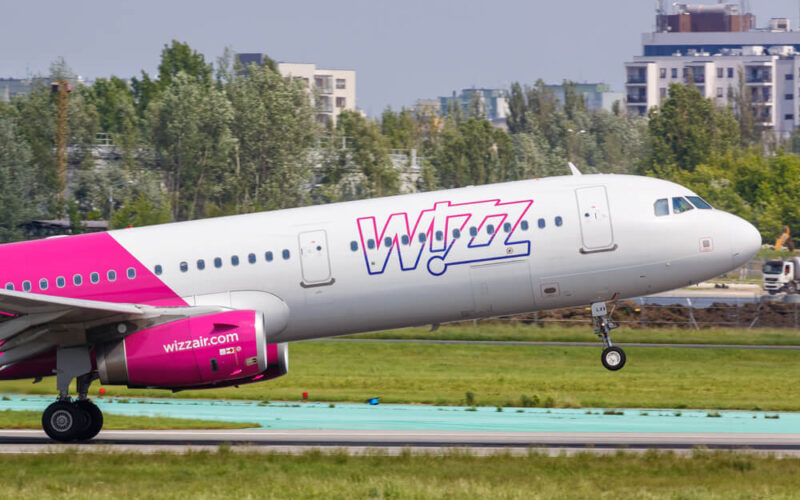During the peak of the coronacrisis, Wizz Air made over 1,000 pilots and cabin crew redundant, as it tried to limit its expenses. Now, the same pilots will have to go through the same recruitment process along with almost 4,000 fresh candidates who want to join the airline, reveals an internal letter seen by AeroTime News.
The airline has begun its recruitment process for its Abu Dhabi-based subsidiary and other European bases, including the newly inaugurated bases in Germany, Romania, and Russia. So far, the airline has received almost 4,000 applications from pilots, including captains and first officers, according to a letter, dated July 24, 2020.
The letter also indicates that the airline will accept two new aircraft, namely one Airbus A320 and one Airbus A321, in the coming week. In total, the Hungary-based planned to add 10 new aircraft to its fleet by March 2021, including seven new A320neo and A321neos, while four A320ceo would be retired.
Wizz Air’s fired pilots will have the priority over these applicants. However, they will follow the same rules and guidelines as the other potential candidates, reads the airline’s update to its employees.
“These redundant pilots will have to follow the same application process as a new joiner to comply with GDPR restrictions and also to meet the EASA mandate to be psychologically tested prior to employment.”
Joining EASA supervision despite safety concerns
Wizz Air is also on the verge of being looked over by the European Union Safety Aviation Agency (EASA) instead of its native aviation authority, the Hungarian National Transport Authority (NTA). The Hungary-based company joined Greece’s Aegean Airlines (32A) and the British low-cost carrier easyJet, as well as seven airport operators, in EASA’s program to abide by guidelines developed by the agency to return to normal operations during COVID-19.
However, the airline also seemingly ignored other safety concerns laid out by EASA. In its review of potential safety issues that could arise from the current pandemic, EASA highlighted that crew fatigue was one of the concerning factors that could potentially lead to safety lapses in an airline’s operations.
“With redundancy and furlough reducing the available number of personnel, those left working may have to work additional hours. The preparation for, and eventual return to (new) normal operations will require significant additional effort in comparison with actual normal operations,” leading to rising levels of fatigue, read the review by EASA.
Unions underlined the safety issues that might arise from the labor practices undertaken by Wizz Air. The airline is accused of discriminatory practices, whereupon flight crews were laid off by their track record of sick leave days, refusals to work on off days, and responses to exhausting rosters.
“These actions endanger the public safety by forcing crew members to work sick or fatigued due to genuine fear from retaliation in the form of dismissal in violation of EASA ORO,” reads a publicly addressed letter to EASA by FPU Romania, a pilot and flight attendant union. When the aforementioned 1,000 employees were laid off by the low-cost carrier, Wizz Air’s Chief Executive Officer (CEO) József Váradi cited three criteria that were used in order to determine whose job will be axed, as the airline dismissed 19% of its total workforce. One of the bullet points was that a person was not a “cultural fit to Wizz Air.”
“Numerous reports speak about fatigued Captains at work that attempt to “help” the company by working from OFF days after a long week of rotation,” while another dismissed captain heard first officers complaining about fatigue after being scheduled for seven days in a row.
“The atmosphere in the company is that of genuine fear of discrimination and persecution which leads to a reduction in the level of safety,” reads the union’s letter to EASA.
Wizz Air was also at the forefront of a potential shareholder revolt due to the fact that its bosses got a hefty payout, despite missing profit targets, the layoffs, and that it used the United Kingdom’s furlough scheme, reported The Times on July 18, 2020.
According to FY2020 financial report, the CEO of the company is entitled to a $624,729 (€532,714) bonus payment for 2020, paid in two installments: one in November 2020 and the other in May 2021. The revolt is caused by the fact that the airline missed its profit target in FY2020, as the low-cost carrier ended the financial year with a $329.5 million (€281.1 million) net profit, while the bonus threshold was $344.6 million (€294 million).
The annual meeting of the airline’s shareholders will take place on July 28, 2020. A day later, the company is set to announce its Q1 FY2021 results.

